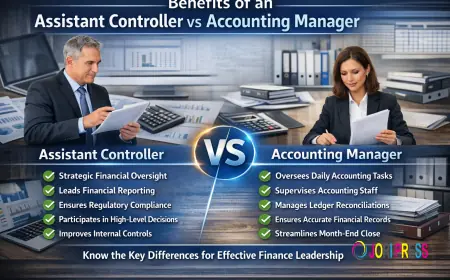What Does a Website Development Agency Really Do? A Beginner’s Guide
Discover what a website development agency really does — from planning and design to development, integrations, and post-launch support. A complete beginner’s guide to building your website professionally.

If you’ve ever thought, “I need a website, but I don’t know where to start,”—you’re not alone.
Many business owners, startups, and even marketing teams struggle to understand what a website development agency actually does. Is it just about writing code? Designing pages? Or hosting your website?
In reality, a website development agency does much more than just "build websites." It’s a team of strategists, designers, developers, SEO specialists, and project managers working together to create a functional, beautiful, and results-driven online presence.
In this beginner’s guide, we’ll break down exactly what a website development agency does, why it matters, and how they help businesses thrive in the digital world.
Let’s get started! ?
1. Strategy & Planning: Building the Blueprint
Before any design or coding begins, a good website development agency starts with discovery and planning.
This phase includes:
-
Understanding your business goals
(e.g., generate leads, sell products, book appointments)
-
Identifying your target audience
-
Analyzing competitors and market trends
-
Mapping out key features and functionality
-
Creating a project roadmap and timeline
Why it matters: This strategic foundation ensures that the website aligns with your brand, business objectives, and user needs.
2. Website Design: Creating the Visual Experience
Next comes the design phase, where your website starts to take visual form.
A website development agency typically includes professional UI/UX designers who create:
-
Wireframes (basic layout structures)
-
High-fidelity mockups (final design concepts)
-
Responsive layouts (mobile + tablet-friendly)
-
Consistent branding (colors, fonts, logos, icons)
Good design isn’t just about looks — it’s about usability. A great website feels intuitive, guides users effortlessly, and encourages action (like clicking "Buy Now" or "Contact Us").
3. Web Development: Bringing Design to Life With Code
Once the design is approved, the development team begins the technical build.
This stage is often divided into:
a. Front-End Development
This is everything users see and interact with — built using HTML, CSS, JavaScript, React, etc.
b. Back-End Development
This is the server-side — the engine behind your site. It handles databases, user authentication, payments, and dynamic content. Languages might include PHP, Python, Node.js, Ruby, etc.
c. CMS Integration
A website development agency might also integrate a Content Management System like WordPress, Shopify, or a custom CMS — so you can edit your site content without touching code.
Result: A fully functional website that’s fast, secure, scalable, and tailored to your specific business needs.
4. Integrations & Features
Modern websites aren’t standalone brochures — they’re interactive platforms that connect with various tools and systems.
A development agency can help integrate:
-
Payment gateways (Stripe, PayPal)
-
CRMs (HubSpot, Salesforce)
-
Email marketing platforms (Mailchimp, Klaviyo)
-
Booking systems
-
Live chat or chatbots
-
Social media feeds
-
Analytics tools (Google Analytics, Hotjar)
These integrations are vital for automation, marketing, and improving customer experience.
5. Testing & Quality Assurance (QA)
Before your site goes live, it needs to be tested — thoroughly.
A professional website development agency will conduct:
-
Cross-browser testing (Chrome, Safari, Firefox, etc.)
-
Mobile and tablet testing
-
Form and function checks
-
Speed and performance testing
-
Security scans
-
Broken link audits
Goal: To make sure the site performs flawlessly for every user — on every device.
6. Website Launch
Once everything’s tested and approved, it’s time to go live! ?
The launch process includes:
-
Migrating the website from staging to the live server
-
Setting up hosting and domain DNS
-
Connecting Google Analytics, Search Console, and SEO tools
-
Running final launch-day checklists
A quality website development agency doesn't just hit “publish” — they monitor everything in real-time to handle bugs, server issues, or user feedback in the first few hours after launch.
7. Post-Launch Support & Maintenance
Think your job is done after the website launches? Think again.
Websites are living assets — they need updates, fixes, and upgrades.
Most agencies offer:
-
Ongoing support plans
-
Regular backups
-
Software/plugin updates
-
Bug fixes and security patches
-
Content edits or new feature additions
Keeping your website maintained helps prevent downtime, data loss, and poor user experience.
Bonus: Ecommerce & Custom Web Applications
If you’re launching an online store or complex web app, a website development agency can also handle:
-
Product page design and categorization
-
Shopping cart and checkout functionality
-
Inventory management integration
-
Shipping and tax settings
-
User accounts and wishlists
-
Subscription or membership models
And for advanced solutions like learning portals, dashboards, or booking platforms — they can develop custom web applications tailored to your business.
In Summary: What You Really Get When You Hire a Website Development Agency
|
Service Area |
What You Get |
|
Strategy |
Goal alignment, user journeys, project planning |
|
Design |
Custom UI/UX, responsive mockups |
|
Development |
Front-end, back-end, CMS integration |
|
Integrations |
Payment, CRM, marketing, analytics |
|
QA & Testing |
Speed, compatibility, security checks |
|
Launch |
Seamless go-live process |
|
Maintenance |
Updates, support, content changes |
Final Thoughts: Is a Website Development Agency Right for You?
If you want more than just a template website...
If you need a custom, scalable, and results-driven online presence...
If you want peace of mind knowing experts are managing every detail...
Then yes — working with a website development agency is the smart move.
Whether you're a startup, small business, or established enterprise, partnering with the right agency means you can focus on your business while they handle the tech.
What's Your Reaction?
 Like
0
Like
0
 Dislike
0
Dislike
0
 Love
0
Love
0
 Funny
0
Funny
0
 Angry
0
Angry
0
 Sad
0
Sad
0
 Wow
0
Wow
0












































